2025外研版高中英语选择性必修第二册强化练习题--Unit 1 Part 1 Starting out & Understanding ideas(含答案与解析)
文档属性
| 名称 | 2025外研版高中英语选择性必修第二册强化练习题--Unit 1 Part 1 Starting out & Understanding ideas(含答案与解析) |
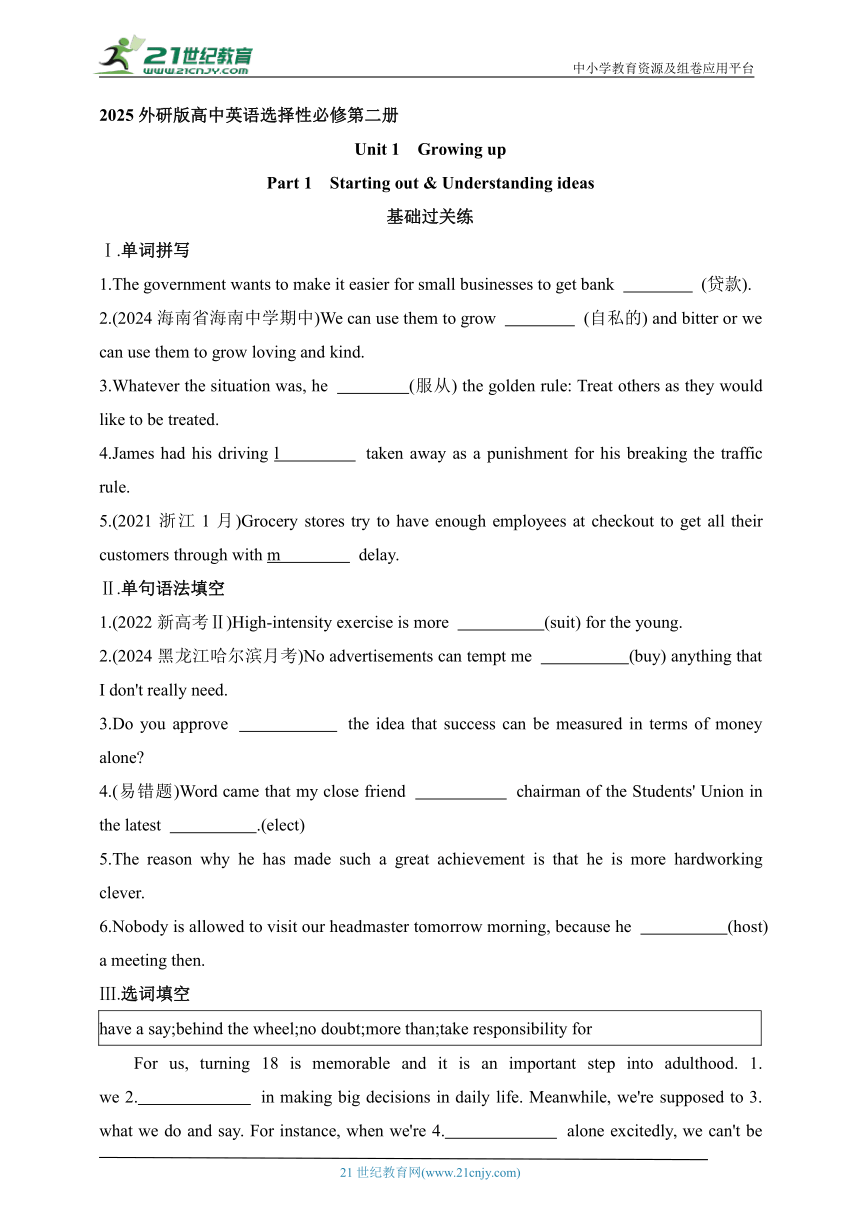
|
|
| 格式 | docx | ||
| 文件大小 | 351.9KB | ||
| 资源类型 | 试卷 | ||
| 版本资源 | 外研版(2019) | ||
| 科目 | 英语 | ||
| 更新时间 | 2024-12-14 16:21:33 | ||
图片预览

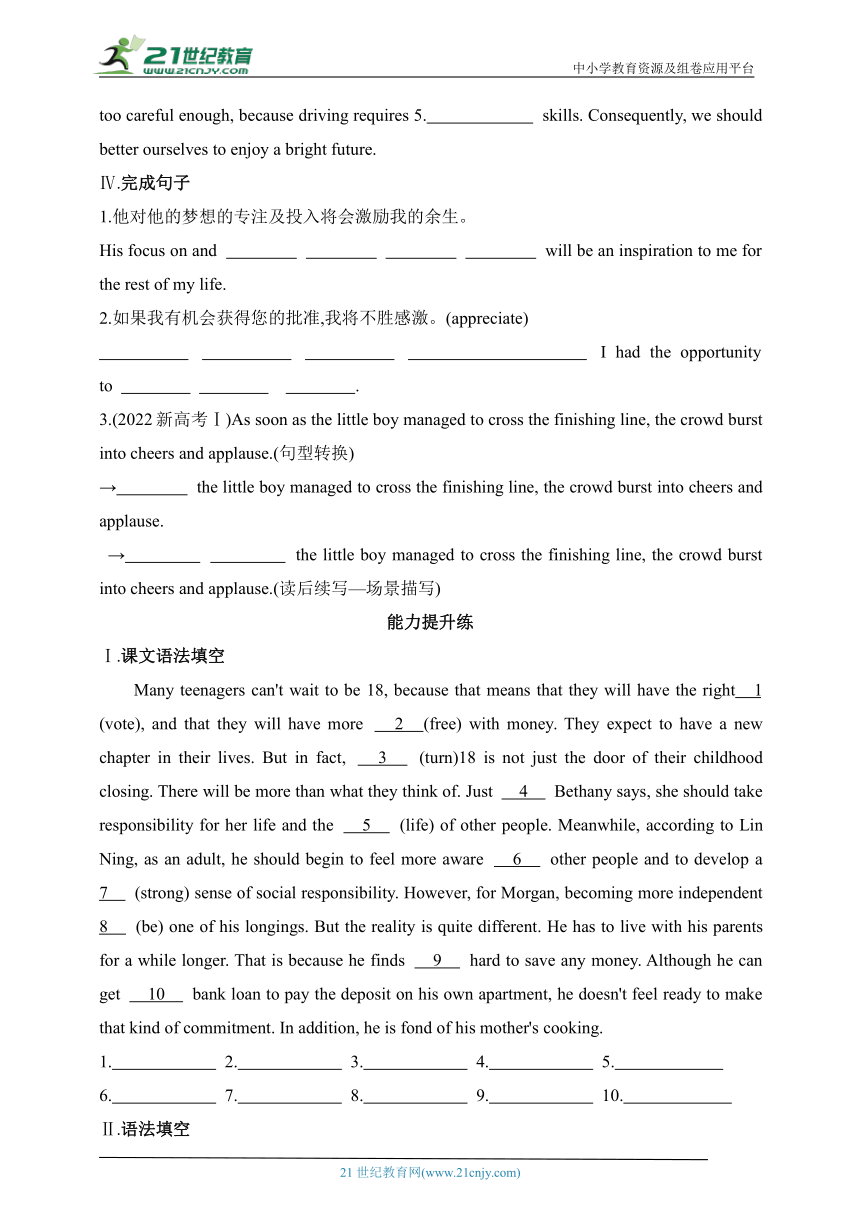
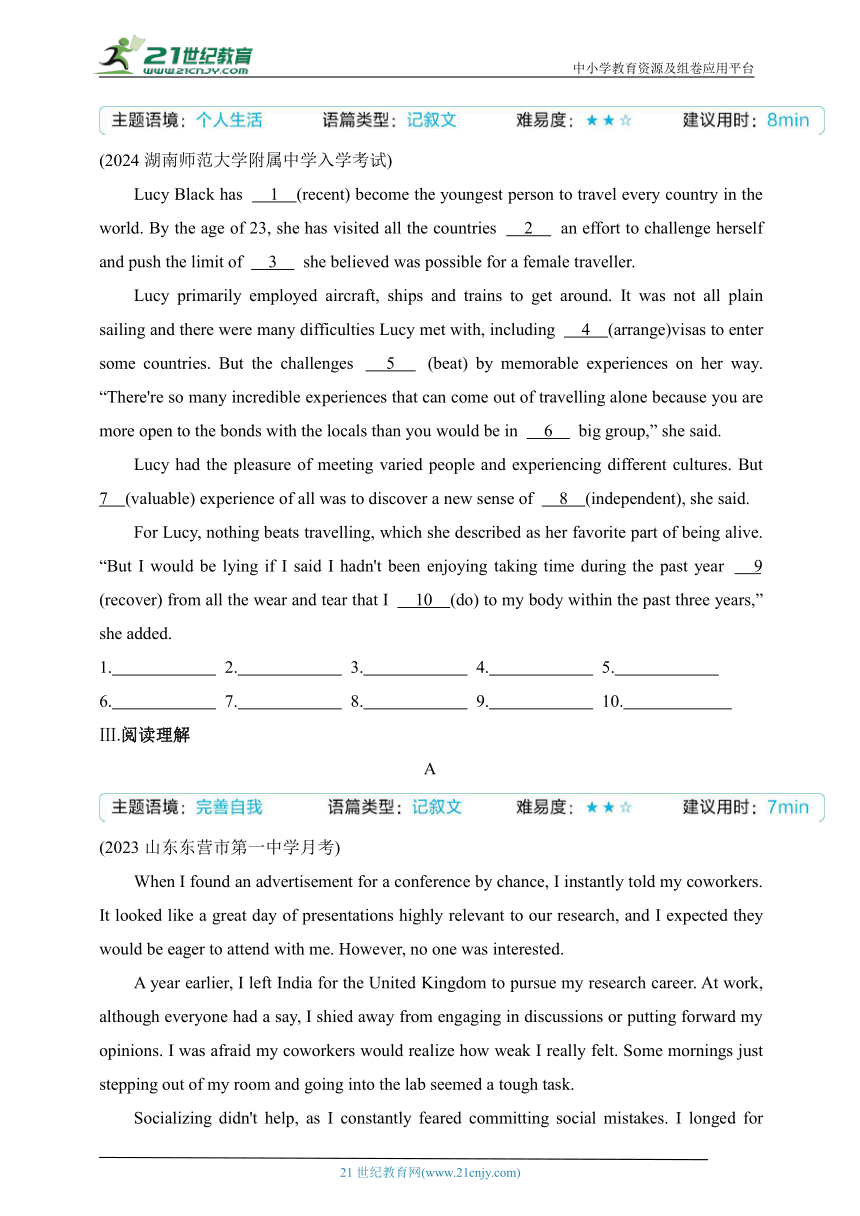
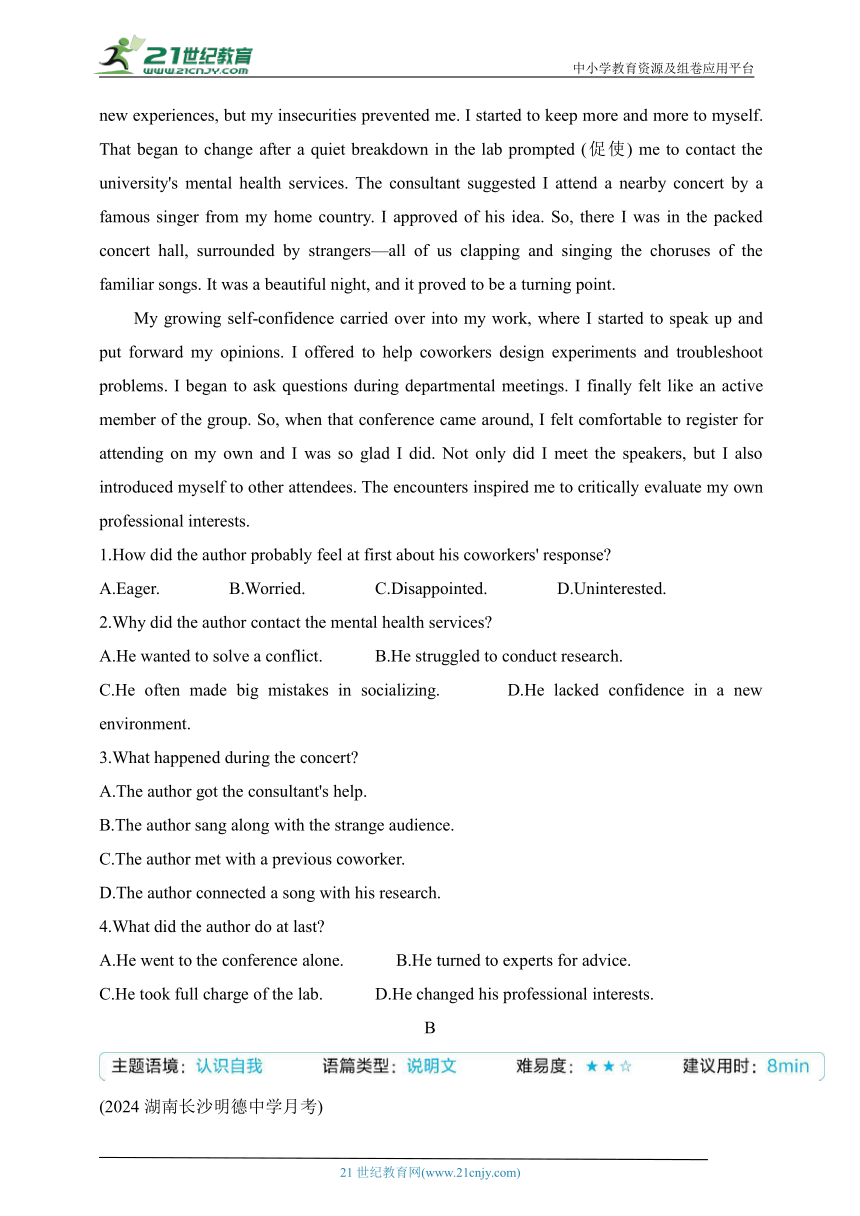
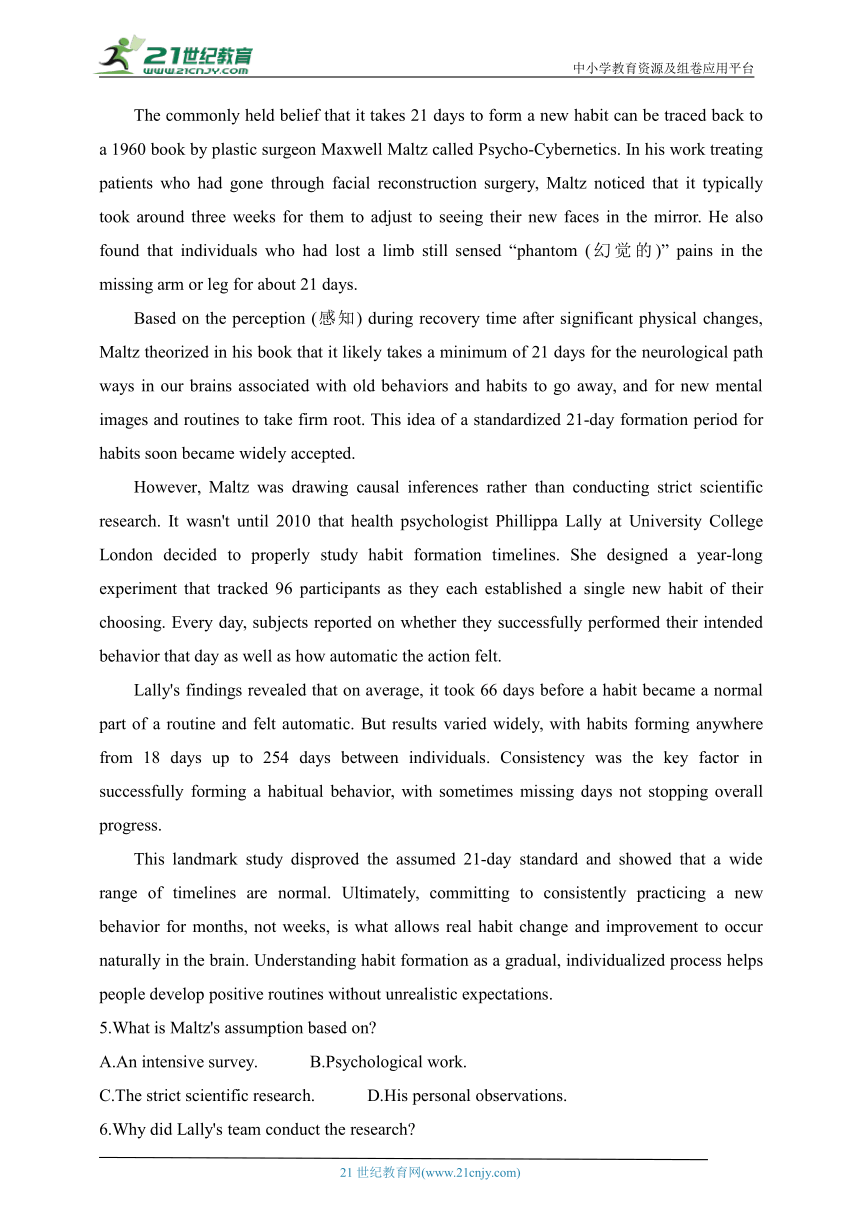
文档简介
中小学教育资源及组卷应用平台
2025外研版高中英语选择性必修第二册
Unit 1 Growing up
Part 1 Starting out & Understanding ideas
基础过关练
Ⅰ.单词拼写
1.The government wants to make it easier for small businesses to get bank (贷款).
2.(2024海南省海南中学期中)We can use them to grow (自私的) and bitter or we can use them to grow loving and kind.
3.Whatever the situation was, he (服从) the golden rule: Treat others as they would like to be treated.
4.James had his driving l taken away as a punishment for his breaking the traffic rule.
5.(2021浙江1月)Grocery stores try to have enough employees at checkout to get all their customers through with m delay.
Ⅱ.单句语法填空
1.(2022新高考Ⅱ)High-intensity exercise is more (suit) for the young.
2.(2024黑龙江哈尔滨月考)No advertisements can tempt me (buy) anything that I don't really need.
3.Do you approve the idea that success can be measured in terms of money alone
4.(易错题)Word came that my close friend chairman of the Students' Union in the latest .(elect)
5.The reason why he has made such a great achievement is that he is more hardworking clever.
6.Nobody is allowed to visit our headmaster tomorrow morning, because he (host) a meeting then.
Ⅲ.选词填空
have a say;behind the wheel;no doubt;more than;take responsibility for
For us, turning 18 is memorable and it is an important step into adulthood. 1. we 2. in making big decisions in daily life. Meanwhile, we're supposed to 3. what we do and say. For instance, when we're 4. alone excitedly, we can't be too careful enough, because driving requires 5. skills. Consequently, we should better ourselves to enjoy a bright future.
Ⅳ.完成句子
1.他对他的梦想的专注及投入将会激励我的余生。
His focus on and will be an inspiration to me for the rest of my life.
2.如果我有机会获得您的批准,我将不胜感激。(appreciate)
I had the opportunity to .
3.(2022新高考Ⅰ)As soon as the little boy managed to cross the finishing line, the crowd burst into cheers and applause.(句型转换)
→ the little boy managed to cross the finishing line, the crowd burst into cheers and applause.
→ the little boy managed to cross the finishing line, the crowd burst into cheers and applause.(读后续写—场景描写)
能力提升练
Ⅰ.课文语法填空
Many teenagers can't wait to be 18, because that means that they will have the right 1 (vote), and that they will have more 2 (free) with money. They expect to have a new chapter in their lives. But in fact, 3 (turn)18 is not just the door of their childhood closing. There will be more than what they think of. Just 4 Bethany says, she should take responsibility for her life and the 5 (life) of other people. Meanwhile, according to Lin Ning, as an adult, he should begin to feel more aware 6 other people and to develop a 7 (strong) sense of social responsibility. However, for Morgan, becoming more independent 8 (be) one of his longings. But the reality is quite different. He has to live with his parents for a while longer. That is because he finds 9 hard to save any money. Although he can get 10 bank loan to pay the deposit on his own apartment, he doesn't feel ready to make that kind of commitment. In addition, he is fond of his mother's cooking.
1. 2. 3. 4. 5.
6. 7. 8. 9. 10.
Ⅱ.语法填空
(2024湖南师范大学附属中学入学考试)
Lucy Black has 1 (recent) become the youngest person to travel every country in the world. By the age of 23, she has visited all the countries 2 an effort to challenge herself and push the limit of 3 she believed was possible for a female traveller.
Lucy primarily employed aircraft, ships and trains to get around. It was not all plain sailing and there were many difficulties Lucy met with, including 4 (arrange)visas to enter some countries. But the challenges 5 (beat) by memorable experiences on her way. “There're so many incredible experiences that can come out of travelling alone because you are more open to the bonds with the locals than you would be in 6 big group,” she said.
Lucy had the pleasure of meeting varied people and experiencing different cultures. But 7 (valuable) experience of all was to discover a new sense of 8 (independent), she said.
For Lucy, nothing beats travelling, which she described as her favorite part of being alive. “But I would be lying if I said I hadn't been enjoying taking time during the past year 9 (recover) from all the wear and tear that I 10 (do) to my body within the past three years,” she added.
1. 2. 3. 4. 5.
6. 7. 8. 9. 10.
Ⅲ.阅读理解
A
(2023山东东营市第一中学月考)
When I found an advertisement for a conference by chance, I instantly told my coworkers. It looked like a great day of presentations highly relevant to our research, and I expected they would be eager to attend with me. However, no one was interested.
A year earlier, I left India for the United Kingdom to pursue my research career. At work, although everyone had a say, I shied away from engaging in discussions or putting forward my opinions. I was afraid my coworkers would realize how weak I really felt. Some mornings just stepping out of my room and going into the lab seemed a tough task.
Socializing didn't help, as I constantly feared committing social mistakes. I longed for new experiences, but my insecurities prevented me. I started to keep more and more to myself. That began to change after a quiet breakdown in the lab prompted (促使) me to contact the university's mental health services. The consultant suggested I attend a nearby concert by a famous singer from my home country. I approved of his idea. So, there I was in the packed concert hall, surrounded by strangers—all of us clapping and singing the choruses of the familiar songs. It was a beautiful night, and it proved to be a turning point.
My growing self-confidence carried over into my work, where I started to speak up and put forward my opinions. I offered to help coworkers design experiments and troubleshoot problems. I began to ask questions during departmental meetings. I finally felt like an active member of the group. So, when that conference came around, I felt comfortable to register for attending on my own and I was so glad I did. Not only did I meet the speakers, but I also introduced myself to other attendees. The encounters inspired me to critically evaluate my own professional interests.
1.How did the author probably feel at first about his coworkers' response
A.Eager. B.Worried. C.Disappointed. D.Uninterested.
2.Why did the author contact the mental health services
A.He wanted to solve a conflict. B.He struggled to conduct research.
C.He often made big mistakes in socializing. D.He lacked confidence in a new environment.
3.What happened during the concert
A.The author got the consultant's help.
B.The author sang along with the strange audience.
C.The author met with a previous coworker.
D.The author connected a song with his research.
4.What did the author do at last
A.He went to the conference alone. B.He turned to experts for advice.
C.He took full charge of the lab. D.He changed his professional interests.
B
(2024湖南长沙明德中学月考)
The commonly held belief that it takes 21 days to form a new habit can be traced back to a 1960 book by plastic surgeon Maxwell Maltz called Psycho-Cybernetics. In his work treating patients who had gone through facial reconstruction surgery, Maltz noticed that it typically took around three weeks for them to adjust to seeing their new faces in the mirror. He also found that individuals who had lost a limb still sensed “phantom (幻觉的)” pains in the missing arm or leg for about 21 days.
Based on the perception (感知) during recovery time after significant physical changes, Maltz theorized in his book that it likely takes a minimum of 21 days for the neurological path ways in our brains associated with old behaviors and habits to go away, and for new mental images and routines to take firm root. This idea of a standardized 21-day formation period for habits soon became widely accepted.
However, Maltz was drawing causal inferences rather than conducting strict scientific research. It wasn't until 2010 that health psychologist Phillippa Lally at University College London decided to properly study habit formation timelines. She designed a year-long experiment that tracked 96 participants as they each established a single new habit of their choosing. Every day, subjects reported on whether they successfully performed their intended behavior that day as well as how automatic the action felt.
Lally's findings revealed that on average, it took 66 days before a habit became a normal part of a routine and felt automatic. But results varied widely, with habits forming anywhere from 18 days up to 254 days between individuals. Consistency was the key factor in successfully forming a habitual behavior, with sometimes missing days not stopping overall progress.
This landmark study disproved the assumed 21-day standard and showed that a wide range of timelines are normal. Ultimately, committing to consistently practicing a new behavior for months, not weeks, is what allows real habit change and improvement to occur naturally in the brain. Understanding habit formation as a gradual, individualized process helps people develop positive routines without unrealistic expectations.
5.What is Maltz's assumption based on
A.An intensive survey. B.Psychological work.
C.The strict scientific research. D.His personal observations.
6.Why did Lally's team conduct the research
A.To prove Maltz's theory on habit formation.
B.To identify timelines for establishing new habits.
C.To explore the factors in affecting habit formation.
D.To present advantages of developing good behavior.
7.What do we know about Lally's findings
A.There are large individual differences in forming habits.
B.Most participants took 66 days to form a habitual behavior.
C.It is harder to form a new habit than to persist with an old one.
D.Occasional stops have a big effect on the progress of habit formation.
8.What is the best title for the text
A.What Is the Key to Forming a New Habit
B.How Do We Develop Positive Routines
C.When Is the Best Time to Start a New Habit D.Does It Really Take 21 Days to Build a New Habit
答案与分层梯度式解析
Unit 1 Growing up
Part 1 Starting out & Understanding ideas
基础过关练
Ⅰ.1.loans 2.selfish 3.obeyed 4.licence 5.minimum
Ⅱ.1.suitable 考查形容词。 句意:高强度运动更适合年轻人。根据句意可知,此处使用的是固定搭配“be suitable for”,意为“适合……”。故填suitable。
2.to buy 考查动词不定式。句意:没有广告能诱惑我买任何我不是真的需要的东西。tempt sb. to do sth.为固定搭配,意为“诱惑某人做某事”,故填to buy。
3.of 考查介词。句意:你赞同成功只能用金钱来衡量的观点吗 由句意可知,此处使用的是固定搭配“approve of”,表示“赞同,支持”。故填of。
4.was elected;election 第一空考查时态、语态和主谓一致,第二空考查名词。句意:有消息传来说我的密友在最近的选举中当选为学生会主席。分析句子结构可知,came后为that引导的同位语从句,从句中缺少谓语;结合句意和主句中的谓语“came”可知要用一般过去时;从句主语my close friend与elect之间为被动关系,应用被动语态,且主语为第三人称单数,故第一空填was elected。根据第二空前的“in the latest”可知,设空处应用名词作介词in的宾语;由句意可知第二空表示“选举”,故填election。
易错归因
第一空容易出现时态或语态的错误或是判断不出来其作谓语,不知道该用什么词性,原因是学生对考查角度思考不全面或是句子成分分析错误。首先要注意区分主从句,that引导同位语从句,然后再判断哪空是从句的谓语。也可以先由第二空作介词in的宾语推断出第一空是谓语。
5.than 考查固定结构。句意:他取得如此大的成就,与其说是因为他聪明倒不如说是因为他勤奋。由句意可知此处使用的是固定结构“more...than...”,表示“与其说……,不如说……”。故填than。
6.will be hosting 考查时态。句意:明天上午,任何人不得拜访我们的校长,因为他那时将在主持一个会议。根据句意可知,此处表示将来某段时间内正在发生的事,再结合句中的tomorrow morning 和then可知用将来进行时。
Ⅲ.1.No doubt
类比启发
no doubt意为“无疑……”。与doubt相关的句型:there is no doubt that...,意为“毫无疑问……”。
2.have a say 3.take responsibility for 4.behind the wheel 5.more than
Ⅳ.1.commitment to his dream 2.I would appreciate it if; win your approval 3.Instantly/Immediately;The instant/moment/minute
能力提升练
Ⅰ.1.to vote 考查动词不定式。抽象名词“right”后要用不定式作后置定语,常用搭配“have the right to do sth.”表示“有做某事的权利”。故填to vote。
2.freedom 考查名词。此处作have的宾语,应用名词。故填freedom。
3.turning 考查动名词。根据后面的系动词is可知“ 3 18”作主语。由句意“但事实上,到达18岁不仅仅是他们童年的门关闭了。”可知,这里表示抽象概念,应用动名词作主语,故填turning。
4.as 考查定语从句。在该句中,逗号前后为两个完整的句子, 此处表示“正如Bethany所说”,因此设空处引导非限制性定语从句,表示“正如,正像”,故填as。
5.lives 考查名词复数。根据空前的the和空后的of可知,此处应用名词形式,再由other people可知此处应用life的复数形式,故填lives。
6.of 考查介词。feel/be aware of为固定搭配,表示“意识到”,故填of。
7.stronger 考查形容词的比较级。根据前面的more aware以及并列连词and和语境可知,此处也应用比较级形式,故填stronger。
8.is 考查时态和主谓一致。分析句子结构可知,空格处为谓语,主语为动名词短语,且此处表示一种事实,应用一般现在时,故填is。
9.it 考查代词。此处应用it作形式宾语,后边的不定式短语to save any money是真正的宾语。故填it。
10.a 考查冠词。此处表示“尽管他可以向银行贷款来支付自己公寓的定金”。loan表示“贷款”时是可数名词,其前应用冠词;此处表泛指,应用不定冠词,且bank以辅音音素开头,故填a。
Ⅱ.◎语篇解读 本文是一篇记叙文。文章介绍了最近Lucy Black成为最年轻的环游世界各国的人,并分享了她的旅行经历和成长感受。
1.recently 考查副词。句意:最近,露西·布莱克成为环游世界每个国家的最年轻的人。修饰谓语has become应用副词作状语。故填recently。
2. in 考查介词。句意:到23岁时,她已经走遍了所有的国家,她努力挑战自己,挑战她认为女性旅行者可能达到的极限。分析句子成分并结合句意可知,此处使用了固定短语“in an effort to do sth.”作状语,意为“努力做某事”。故填in。
3.what 考查宾语从句。分析句子结构可知,“ 3 she believed was possible for a female traveller”作介词of的宾语,且为完整的句子,故推断设空处引导宾语从句;宾语从句中“she believed”为插入语,从句缺少主语,结合句意可知,设空处表示“什么”,指物,因此应用连接代词what引导宾语从句。故填what。
4. arranging 考查动名词。此处表示列举的例子,介词including后要用动名词作宾语,引出具体的困难。故填arranging。
5.were beaten 考查时态、语态和主谓一致。句意:但是她一路上的难忘经历要胜过这些挑战。结合“on her way”和上下文可知,本句应用一般过去时。根据句意及空后的by可知,challenges与beat之间是被动关系,表示“挑战被胜过”,要用被动语态,且主语是复数形式,故填were beaten。
6.a 考查冠词。句意:独自旅行可以带来很多不可思议的经历,因为相较于身处大团体之中,你更愿意和当地人建立联系……。由后面的big group可知设空处应用冠词限定big group。结合句意可知此处表示“一个大的团体”,表泛指,应用不定冠词;big以辅音音素开头,故填a。
7.the most valuable 考查形容词最高级。句意:她说,但是所有经历中最宝贵的经历是发现了一种新的独立感。根据“experience of all”可推知,此处使用的是固定搭配“the+形容词最高级+单数名词+表示范围的短语”,意为“……中最……的……”,因此设空处应用形容词的最高级。故填the most valuable。
8.independence 考查名词。句意同上。分析句子可知,空处作介词of的宾语,应用名词;结合Lucy独自环游世界的经历和句意可推知,此处表示“独立”,应用independent的名词形式independence,是不可数名词。故填independence。
9. to recover 考查动词不定式。句意:但如果我说,我不喜欢在过去的一年里花时间从过去三年我对我的身体造成的所有磨损中恢复过来,那我就是在撒谎……。根据“taking time”可推知,此处使用的是固定搭配“take time to do sth.”,意为“花时间做某事”。故填to recover。
10.have done 考查时态和主谓一致。句意同上。分析句子结构可知,“that I 10 to my body within the past three years”为that引导的定语从句,设空处在该从句中作谓语。根据从句中的时间状语“within the past three years”和句意可知,此处要用现在完成时表示过去对现在的结果和影响。从句主语是I,故填have done。
【高频词汇】 1.challenge v.发出挑战 n.挑战
2.primarily adv.主要地;通常 3.incredible adj.难以置信的 4.wear and tear损耗
Ⅲ.A
◎语篇解读 本文是一篇记叙文,主要讲的是作者曾经因害怕犯社交错误而不跟人来往,联系了大学的心理健康服务机构后情况开始变化,作者的自信不断增强,并延续到了工作中。
1.C 推理判断题。根据第一段中的“...I expected they would be eager to attend with me. However, no one was interested.”可知,同事们对作者的提议不感兴趣,再结合第一段中的“It looked like a great day of presentations highly relevant to our research”可知作者希望和同事们一起参加,但他们都不感兴趣,所以对于同事们的反应,作者一开始可能会感到失望。故选C。
2.D 推理判断题。根据第二段的第二句可知作者回避参与讨论,不敢提出自己的看法;根据第三段的前两句可知作者总是害怕犯社交错误,渴望新的体验,但是又没有安全感。由此可以推断,作者联系心理健康服务机构是因为他在新环境中缺乏信心。故选D。
易错归因
本题很容易根据第三段中的“Socializing didn't help, as I constantly feared committing social mistakes.”而误选C项,错把句中的“Socializing”“mistakes”与C项中的mistakes in socializing建立联系。但是这句话强调的是作者怕犯社交错误,而C项说的是“他经常犯严重的社交错误”,表达的不是一个意思,故不能选C。
3.B 细节理解题。根据第三段中的“So, there I was in the packed concert hall, surrounded by strangers—all of us clapping and singing the choruses of the familiar songs.”可知,音乐会期间作者和陌生的观众一起唱歌。故选B。
4.A 细节理解题。根据最后一段中的“So, when that conference came around, I felt comfortable to register for attending on my own and I was so glad I did.”可知,作者最后一个人去参加了那个会议。故选A。
【高频词汇】 1.relevant adj.紧密相关的;切题的
2.pursue v.追求,致力于;追逐,追赶 3.engage in从事,参加 4.put forward提出(观点,看法) 5.tough adj.艰难的,棘手的;严厉的;强硬的 6.long for 渴望
7.surround v.包围,围绕 8.register v.登记,注册
9.encounter n.邂逅,特殊经历
【熟词生义】 shy v.被吓退 shy away from 躲避……,避免做……
【差距词汇】 troubleshoot v.解决重大问题;排除故障
B
◎语篇解读 本文是一篇说明文。文章主要介绍的是健康心理学家Phillippa Lally通过研究,推翻了人们所认同的21天养成新习惯的理论,发现形成新均需要66天,而且个体差异很大。
5. D 细节理解题。根据第二段第一句的关键信息“基于(人们)在重大身体变化后恢复时间期间的感知,Maltz在他的书中提出了一个理论……”和第一段中感知的得来方式“In his work...Maltz noticed that...He also found that...”可知,他的假设是基于个人观察。故选D。
6.B 推理判断题。根据第三段第二句“直到2010年,伦敦大学学院的健康心理学家Phillippa Lally才决定正确地研究习惯形成的限期。”可知,Lally的团队要通过研究确定形成新习惯的限期。故选B。
7.A 细节理解题。根据倒数第二段第一、二句“Lally的研究结果显示,一个均需要66天才能成为日常生活的一部分,并让人觉得是自然而然的。但结果差异很大,个体之间的习惯形成时间从18天到254天不等。”可知,研究发现习惯的形成有很大的个体差异。故选A。
8.D 主旨大意题。本文为研究发现类文章,其结构为:
由此可知,“养成一个新习惯真的需要21天吗 ”概括了全文的主题。故选D。
【高频词汇】 1.surgeon n.外科医生 surgery n.外科手术 2.(be) associated with 与……相关 3.track v.追踪 n.轨道;路径;跑道 4.participant n.参与者 5.reveal v.显示,透露
【差距词汇】 1.facial reconstruction 面部重塑
2.theorize v.理论化,形成理论 3.habitual adj.习惯性的;积习很深的 4.disprove v.证明……是错误的/虚假的 5.assumed adj.假设的,假定的
长难句
原句 In his work treating patients who had gone through facial reconstruction surgery, Maltz noticed that it typically took around three weeks for them to adjust to seeing their new faces in the mirror.
分析 这是一个主从复合句。who引导定语从句,修饰patients;that引导宾语从句,从句中it作形式主语,真正的主语是“to adjust to...”。
译文 在Maltz治疗之前经历过面部重塑手术的病人的工作中,他留意到他们适应看到镜子中自己的新面孔一般需要大约三周的时间。
21世纪教育网 www.21cnjy.com 精品试卷·第 2 页 (共 2 页)
21世纪教育网(www.21cnjy.com)
2025外研版高中英语选择性必修第二册
Unit 1 Growing up
Part 1 Starting out & Understanding ideas
基础过关练
Ⅰ.单词拼写
1.The government wants to make it easier for small businesses to get bank (贷款).
2.(2024海南省海南中学期中)We can use them to grow (自私的) and bitter or we can use them to grow loving and kind.
3.Whatever the situation was, he (服从) the golden rule: Treat others as they would like to be treated.
4.James had his driving l taken away as a punishment for his breaking the traffic rule.
5.(2021浙江1月)Grocery stores try to have enough employees at checkout to get all their customers through with m delay.
Ⅱ.单句语法填空
1.(2022新高考Ⅱ)High-intensity exercise is more (suit) for the young.
2.(2024黑龙江哈尔滨月考)No advertisements can tempt me (buy) anything that I don't really need.
3.Do you approve the idea that success can be measured in terms of money alone
4.(易错题)Word came that my close friend chairman of the Students' Union in the latest .(elect)
5.The reason why he has made such a great achievement is that he is more hardworking clever.
6.Nobody is allowed to visit our headmaster tomorrow morning, because he (host) a meeting then.
Ⅲ.选词填空
have a say;behind the wheel;no doubt;more than;take responsibility for
For us, turning 18 is memorable and it is an important step into adulthood. 1. we 2. in making big decisions in daily life. Meanwhile, we're supposed to 3. what we do and say. For instance, when we're 4. alone excitedly, we can't be too careful enough, because driving requires 5. skills. Consequently, we should better ourselves to enjoy a bright future.
Ⅳ.完成句子
1.他对他的梦想的专注及投入将会激励我的余生。
His focus on and will be an inspiration to me for the rest of my life.
2.如果我有机会获得您的批准,我将不胜感激。(appreciate)
I had the opportunity to .
3.(2022新高考Ⅰ)As soon as the little boy managed to cross the finishing line, the crowd burst into cheers and applause.(句型转换)
→ the little boy managed to cross the finishing line, the crowd burst into cheers and applause.
→ the little boy managed to cross the finishing line, the crowd burst into cheers and applause.(读后续写—场景描写)
能力提升练
Ⅰ.课文语法填空
Many teenagers can't wait to be 18, because that means that they will have the right 1 (vote), and that they will have more 2 (free) with money. They expect to have a new chapter in their lives. But in fact, 3 (turn)18 is not just the door of their childhood closing. There will be more than what they think of. Just 4 Bethany says, she should take responsibility for her life and the 5 (life) of other people. Meanwhile, according to Lin Ning, as an adult, he should begin to feel more aware 6 other people and to develop a 7 (strong) sense of social responsibility. However, for Morgan, becoming more independent 8 (be) one of his longings. But the reality is quite different. He has to live with his parents for a while longer. That is because he finds 9 hard to save any money. Although he can get 10 bank loan to pay the deposit on his own apartment, he doesn't feel ready to make that kind of commitment. In addition, he is fond of his mother's cooking.
1. 2. 3. 4. 5.
6. 7. 8. 9. 10.
Ⅱ.语法填空
(2024湖南师范大学附属中学入学考试)
Lucy Black has 1 (recent) become the youngest person to travel every country in the world. By the age of 23, she has visited all the countries 2 an effort to challenge herself and push the limit of 3 she believed was possible for a female traveller.
Lucy primarily employed aircraft, ships and trains to get around. It was not all plain sailing and there were many difficulties Lucy met with, including 4 (arrange)visas to enter some countries. But the challenges 5 (beat) by memorable experiences on her way. “There're so many incredible experiences that can come out of travelling alone because you are more open to the bonds with the locals than you would be in 6 big group,” she said.
Lucy had the pleasure of meeting varied people and experiencing different cultures. But 7 (valuable) experience of all was to discover a new sense of 8 (independent), she said.
For Lucy, nothing beats travelling, which she described as her favorite part of being alive. “But I would be lying if I said I hadn't been enjoying taking time during the past year 9 (recover) from all the wear and tear that I 10 (do) to my body within the past three years,” she added.
1. 2. 3. 4. 5.
6. 7. 8. 9. 10.
Ⅲ.阅读理解
A
(2023山东东营市第一中学月考)
When I found an advertisement for a conference by chance, I instantly told my coworkers. It looked like a great day of presentations highly relevant to our research, and I expected they would be eager to attend with me. However, no one was interested.
A year earlier, I left India for the United Kingdom to pursue my research career. At work, although everyone had a say, I shied away from engaging in discussions or putting forward my opinions. I was afraid my coworkers would realize how weak I really felt. Some mornings just stepping out of my room and going into the lab seemed a tough task.
Socializing didn't help, as I constantly feared committing social mistakes. I longed for new experiences, but my insecurities prevented me. I started to keep more and more to myself. That began to change after a quiet breakdown in the lab prompted (促使) me to contact the university's mental health services. The consultant suggested I attend a nearby concert by a famous singer from my home country. I approved of his idea. So, there I was in the packed concert hall, surrounded by strangers—all of us clapping and singing the choruses of the familiar songs. It was a beautiful night, and it proved to be a turning point.
My growing self-confidence carried over into my work, where I started to speak up and put forward my opinions. I offered to help coworkers design experiments and troubleshoot problems. I began to ask questions during departmental meetings. I finally felt like an active member of the group. So, when that conference came around, I felt comfortable to register for attending on my own and I was so glad I did. Not only did I meet the speakers, but I also introduced myself to other attendees. The encounters inspired me to critically evaluate my own professional interests.
1.How did the author probably feel at first about his coworkers' response
A.Eager. B.Worried. C.Disappointed. D.Uninterested.
2.Why did the author contact the mental health services
A.He wanted to solve a conflict. B.He struggled to conduct research.
C.He often made big mistakes in socializing. D.He lacked confidence in a new environment.
3.What happened during the concert
A.The author got the consultant's help.
B.The author sang along with the strange audience.
C.The author met with a previous coworker.
D.The author connected a song with his research.
4.What did the author do at last
A.He went to the conference alone. B.He turned to experts for advice.
C.He took full charge of the lab. D.He changed his professional interests.
B
(2024湖南长沙明德中学月考)
The commonly held belief that it takes 21 days to form a new habit can be traced back to a 1960 book by plastic surgeon Maxwell Maltz called Psycho-Cybernetics. In his work treating patients who had gone through facial reconstruction surgery, Maltz noticed that it typically took around three weeks for them to adjust to seeing their new faces in the mirror. He also found that individuals who had lost a limb still sensed “phantom (幻觉的)” pains in the missing arm or leg for about 21 days.
Based on the perception (感知) during recovery time after significant physical changes, Maltz theorized in his book that it likely takes a minimum of 21 days for the neurological path ways in our brains associated with old behaviors and habits to go away, and for new mental images and routines to take firm root. This idea of a standardized 21-day formation period for habits soon became widely accepted.
However, Maltz was drawing causal inferences rather than conducting strict scientific research. It wasn't until 2010 that health psychologist Phillippa Lally at University College London decided to properly study habit formation timelines. She designed a year-long experiment that tracked 96 participants as they each established a single new habit of their choosing. Every day, subjects reported on whether they successfully performed their intended behavior that day as well as how automatic the action felt.
Lally's findings revealed that on average, it took 66 days before a habit became a normal part of a routine and felt automatic. But results varied widely, with habits forming anywhere from 18 days up to 254 days between individuals. Consistency was the key factor in successfully forming a habitual behavior, with sometimes missing days not stopping overall progress.
This landmark study disproved the assumed 21-day standard and showed that a wide range of timelines are normal. Ultimately, committing to consistently practicing a new behavior for months, not weeks, is what allows real habit change and improvement to occur naturally in the brain. Understanding habit formation as a gradual, individualized process helps people develop positive routines without unrealistic expectations.
5.What is Maltz's assumption based on
A.An intensive survey. B.Psychological work.
C.The strict scientific research. D.His personal observations.
6.Why did Lally's team conduct the research
A.To prove Maltz's theory on habit formation.
B.To identify timelines for establishing new habits.
C.To explore the factors in affecting habit formation.
D.To present advantages of developing good behavior.
7.What do we know about Lally's findings
A.There are large individual differences in forming habits.
B.Most participants took 66 days to form a habitual behavior.
C.It is harder to form a new habit than to persist with an old one.
D.Occasional stops have a big effect on the progress of habit formation.
8.What is the best title for the text
A.What Is the Key to Forming a New Habit
B.How Do We Develop Positive Routines
C.When Is the Best Time to Start a New Habit D.Does It Really Take 21 Days to Build a New Habit
答案与分层梯度式解析
Unit 1 Growing up
Part 1 Starting out & Understanding ideas
基础过关练
Ⅰ.1.loans 2.selfish 3.obeyed 4.licence 5.minimum
Ⅱ.1.suitable 考查形容词。 句意:高强度运动更适合年轻人。根据句意可知,此处使用的是固定搭配“be suitable for”,意为“适合……”。故填suitable。
2.to buy 考查动词不定式。句意:没有广告能诱惑我买任何我不是真的需要的东西。tempt sb. to do sth.为固定搭配,意为“诱惑某人做某事”,故填to buy。
3.of 考查介词。句意:你赞同成功只能用金钱来衡量的观点吗 由句意可知,此处使用的是固定搭配“approve of”,表示“赞同,支持”。故填of。
4.was elected;election 第一空考查时态、语态和主谓一致,第二空考查名词。句意:有消息传来说我的密友在最近的选举中当选为学生会主席。分析句子结构可知,came后为that引导的同位语从句,从句中缺少谓语;结合句意和主句中的谓语“came”可知要用一般过去时;从句主语my close friend与elect之间为被动关系,应用被动语态,且主语为第三人称单数,故第一空填was elected。根据第二空前的“in the latest”可知,设空处应用名词作介词in的宾语;由句意可知第二空表示“选举”,故填election。
易错归因
第一空容易出现时态或语态的错误或是判断不出来其作谓语,不知道该用什么词性,原因是学生对考查角度思考不全面或是句子成分分析错误。首先要注意区分主从句,that引导同位语从句,然后再判断哪空是从句的谓语。也可以先由第二空作介词in的宾语推断出第一空是谓语。
5.than 考查固定结构。句意:他取得如此大的成就,与其说是因为他聪明倒不如说是因为他勤奋。由句意可知此处使用的是固定结构“more...than...”,表示“与其说……,不如说……”。故填than。
6.will be hosting 考查时态。句意:明天上午,任何人不得拜访我们的校长,因为他那时将在主持一个会议。根据句意可知,此处表示将来某段时间内正在发生的事,再结合句中的tomorrow morning 和then可知用将来进行时。
Ⅲ.1.No doubt
类比启发
no doubt意为“无疑……”。与doubt相关的句型:there is no doubt that...,意为“毫无疑问……”。
2.have a say 3.take responsibility for 4.behind the wheel 5.more than
Ⅳ.1.commitment to his dream 2.I would appreciate it if; win your approval 3.Instantly/Immediately;The instant/moment/minute
能力提升练
Ⅰ.1.to vote 考查动词不定式。抽象名词“right”后要用不定式作后置定语,常用搭配“have the right to do sth.”表示“有做某事的权利”。故填to vote。
2.freedom 考查名词。此处作have的宾语,应用名词。故填freedom。
3.turning 考查动名词。根据后面的系动词is可知“ 3 18”作主语。由句意“但事实上,到达18岁不仅仅是他们童年的门关闭了。”可知,这里表示抽象概念,应用动名词作主语,故填turning。
4.as 考查定语从句。在该句中,逗号前后为两个完整的句子, 此处表示“正如Bethany所说”,因此设空处引导非限制性定语从句,表示“正如,正像”,故填as。
5.lives 考查名词复数。根据空前的the和空后的of可知,此处应用名词形式,再由other people可知此处应用life的复数形式,故填lives。
6.of 考查介词。feel/be aware of为固定搭配,表示“意识到”,故填of。
7.stronger 考查形容词的比较级。根据前面的more aware以及并列连词and和语境可知,此处也应用比较级形式,故填stronger。
8.is 考查时态和主谓一致。分析句子结构可知,空格处为谓语,主语为动名词短语,且此处表示一种事实,应用一般现在时,故填is。
9.it 考查代词。此处应用it作形式宾语,后边的不定式短语to save any money是真正的宾语。故填it。
10.a 考查冠词。此处表示“尽管他可以向银行贷款来支付自己公寓的定金”。loan表示“贷款”时是可数名词,其前应用冠词;此处表泛指,应用不定冠词,且bank以辅音音素开头,故填a。
Ⅱ.◎语篇解读 本文是一篇记叙文。文章介绍了最近Lucy Black成为最年轻的环游世界各国的人,并分享了她的旅行经历和成长感受。
1.recently 考查副词。句意:最近,露西·布莱克成为环游世界每个国家的最年轻的人。修饰谓语has become应用副词作状语。故填recently。
2. in 考查介词。句意:到23岁时,她已经走遍了所有的国家,她努力挑战自己,挑战她认为女性旅行者可能达到的极限。分析句子成分并结合句意可知,此处使用了固定短语“in an effort to do sth.”作状语,意为“努力做某事”。故填in。
3.what 考查宾语从句。分析句子结构可知,“ 3 she believed was possible for a female traveller”作介词of的宾语,且为完整的句子,故推断设空处引导宾语从句;宾语从句中“she believed”为插入语,从句缺少主语,结合句意可知,设空处表示“什么”,指物,因此应用连接代词what引导宾语从句。故填what。
4. arranging 考查动名词。此处表示列举的例子,介词including后要用动名词作宾语,引出具体的困难。故填arranging。
5.were beaten 考查时态、语态和主谓一致。句意:但是她一路上的难忘经历要胜过这些挑战。结合“on her way”和上下文可知,本句应用一般过去时。根据句意及空后的by可知,challenges与beat之间是被动关系,表示“挑战被胜过”,要用被动语态,且主语是复数形式,故填were beaten。
6.a 考查冠词。句意:独自旅行可以带来很多不可思议的经历,因为相较于身处大团体之中,你更愿意和当地人建立联系……。由后面的big group可知设空处应用冠词限定big group。结合句意可知此处表示“一个大的团体”,表泛指,应用不定冠词;big以辅音音素开头,故填a。
7.the most valuable 考查形容词最高级。句意:她说,但是所有经历中最宝贵的经历是发现了一种新的独立感。根据“experience of all”可推知,此处使用的是固定搭配“the+形容词最高级+单数名词+表示范围的短语”,意为“……中最……的……”,因此设空处应用形容词的最高级。故填the most valuable。
8.independence 考查名词。句意同上。分析句子可知,空处作介词of的宾语,应用名词;结合Lucy独自环游世界的经历和句意可推知,此处表示“独立”,应用independent的名词形式independence,是不可数名词。故填independence。
9. to recover 考查动词不定式。句意:但如果我说,我不喜欢在过去的一年里花时间从过去三年我对我的身体造成的所有磨损中恢复过来,那我就是在撒谎……。根据“taking time”可推知,此处使用的是固定搭配“take time to do sth.”,意为“花时间做某事”。故填to recover。
10.have done 考查时态和主谓一致。句意同上。分析句子结构可知,“that I 10 to my body within the past three years”为that引导的定语从句,设空处在该从句中作谓语。根据从句中的时间状语“within the past three years”和句意可知,此处要用现在完成时表示过去对现在的结果和影响。从句主语是I,故填have done。
【高频词汇】 1.challenge v.发出挑战 n.挑战
2.primarily adv.主要地;通常 3.incredible adj.难以置信的 4.wear and tear损耗
Ⅲ.A
◎语篇解读 本文是一篇记叙文,主要讲的是作者曾经因害怕犯社交错误而不跟人来往,联系了大学的心理健康服务机构后情况开始变化,作者的自信不断增强,并延续到了工作中。
1.C 推理判断题。根据第一段中的“...I expected they would be eager to attend with me. However, no one was interested.”可知,同事们对作者的提议不感兴趣,再结合第一段中的“It looked like a great day of presentations highly relevant to our research”可知作者希望和同事们一起参加,但他们都不感兴趣,所以对于同事们的反应,作者一开始可能会感到失望。故选C。
2.D 推理判断题。根据第二段的第二句可知作者回避参与讨论,不敢提出自己的看法;根据第三段的前两句可知作者总是害怕犯社交错误,渴望新的体验,但是又没有安全感。由此可以推断,作者联系心理健康服务机构是因为他在新环境中缺乏信心。故选D。
易错归因
本题很容易根据第三段中的“Socializing didn't help, as I constantly feared committing social mistakes.”而误选C项,错把句中的“Socializing”“mistakes”与C项中的mistakes in socializing建立联系。但是这句话强调的是作者怕犯社交错误,而C项说的是“他经常犯严重的社交错误”,表达的不是一个意思,故不能选C。
3.B 细节理解题。根据第三段中的“So, there I was in the packed concert hall, surrounded by strangers—all of us clapping and singing the choruses of the familiar songs.”可知,音乐会期间作者和陌生的观众一起唱歌。故选B。
4.A 细节理解题。根据最后一段中的“So, when that conference came around, I felt comfortable to register for attending on my own and I was so glad I did.”可知,作者最后一个人去参加了那个会议。故选A。
【高频词汇】 1.relevant adj.紧密相关的;切题的
2.pursue v.追求,致力于;追逐,追赶 3.engage in从事,参加 4.put forward提出(观点,看法) 5.tough adj.艰难的,棘手的;严厉的;强硬的 6.long for 渴望
7.surround v.包围,围绕 8.register v.登记,注册
9.encounter n.邂逅,特殊经历
【熟词生义】 shy v.被吓退 shy away from 躲避……,避免做……
【差距词汇】 troubleshoot v.解决重大问题;排除故障
B
◎语篇解读 本文是一篇说明文。文章主要介绍的是健康心理学家Phillippa Lally通过研究,推翻了人们所认同的21天养成新习惯的理论,发现形成新均需要66天,而且个体差异很大。
5. D 细节理解题。根据第二段第一句的关键信息“基于(人们)在重大身体变化后恢复时间期间的感知,Maltz在他的书中提出了一个理论……”和第一段中感知的得来方式“In his work...Maltz noticed that...He also found that...”可知,他的假设是基于个人观察。故选D。
6.B 推理判断题。根据第三段第二句“直到2010年,伦敦大学学院的健康心理学家Phillippa Lally才决定正确地研究习惯形成的限期。”可知,Lally的团队要通过研究确定形成新习惯的限期。故选B。
7.A 细节理解题。根据倒数第二段第一、二句“Lally的研究结果显示,一个均需要66天才能成为日常生活的一部分,并让人觉得是自然而然的。但结果差异很大,个体之间的习惯形成时间从18天到254天不等。”可知,研究发现习惯的形成有很大的个体差异。故选A。
8.D 主旨大意题。本文为研究发现类文章,其结构为:
由此可知,“养成一个新习惯真的需要21天吗 ”概括了全文的主题。故选D。
【高频词汇】 1.surgeon n.外科医生 surgery n.外科手术 2.(be) associated with 与……相关 3.track v.追踪 n.轨道;路径;跑道 4.participant n.参与者 5.reveal v.显示,透露
【差距词汇】 1.facial reconstruction 面部重塑
2.theorize v.理论化,形成理论 3.habitual adj.习惯性的;积习很深的 4.disprove v.证明……是错误的/虚假的 5.assumed adj.假设的,假定的
长难句
原句 In his work treating patients who had gone through facial reconstruction surgery, Maltz noticed that it typically took around three weeks for them to adjust to seeing their new faces in the mirror.
分析 这是一个主从复合句。who引导定语从句,修饰patients;that引导宾语从句,从句中it作形式主语,真正的主语是“to adjust to...”。
译文 在Maltz治疗之前经历过面部重塑手术的病人的工作中,他留意到他们适应看到镜子中自己的新面孔一般需要大约三周的时间。
21世纪教育网 www.21cnjy.com 精品试卷·第 2 页 (共 2 页)
21世纪教育网(www.21cnjy.com)
